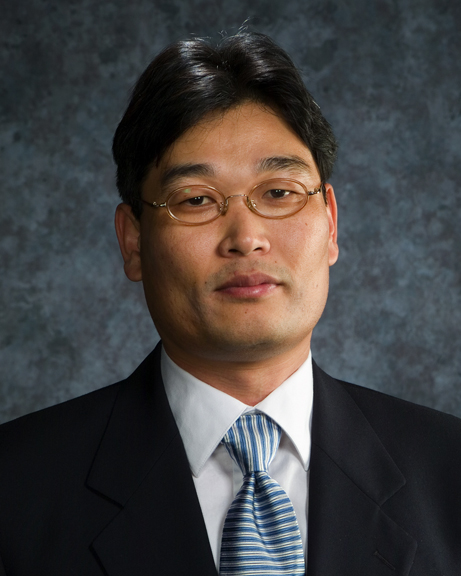FAYETTEVILLE, Ark. – Chang S. Nam, assistant professor in the department of industrial engineering, has received a Faculty Early Career Development grant, also known as a CAREER award, from the National Science Foundation. Nam’s project is intended to help visually impaired students study science.
He and his research team will design, evaluate and implement a computer learning system that uses the sense of touch, or haptic sense, to enable visually impaired students “feel” scientific concepts through tactile, force and temperature sensations. The system will enable visually impaired students to work with sighted students and teachers in collaborative, hands-on science lessons that use multiple, realistic and compatible sensory feedback — visual, auditory and haptic.
This project, which Nam calls “We Feel Science,” shortened from “We Engage with the Flexible Experimental Environment for Learning in Science,” is the direct result of Nam’s previous research, a three-year project, also funded by the National Science Foundation, to develop computer learning applications using touch and sound. The new project seeks to address two problems: the difficulty of teaching science to people with visual disabilities, and the difficulty of teaching science to students in general.
“Science learning poses challenges to both sighted and visually impaired students,” Nam said. “There’s the abstractness of scientific concepts, which don’t relate to the student’s previous knowledge and sensory experience, and are easy to misunderstand. There’s a particular challenge to visually impaired students since most science learning normally involves an overwhelming mass of visual material, while they primarily depend on the sense of touch. The sensory-based learning support systems we will develop can be used to teach all students, while enabling visually impaired students to work together with their classmates, teachers or even with sighted peers in science lessons.”
Nam said that research has shown that students understand scientific ideas best when they are allowed to take an active hands-on role.
“Being able to investigate and experiment with concrete objects can help students think critically and gain confidence in their problem-solving abilities,” he said. “Studies also show that visually impaired students’ ability to understand scientific concepts can be improved by haptic perception combined with hearing. A collaborative learning environment, such as We Feel Science, where students are immersed in a scientific experience helps, them conceptualize and remember a mental model more easily.”
Students with and without visual impairments will be recruited from the Arkansas School for the Blind, the Kansas State School for the Blind and several northwest Arkansas high schools to take part in the project. Nam and his team will also work with science teachers at these schools to integrate the We Feel Science system into their classrooms and labs.
A prime goal of this project is to provide access for students with disabilities to science, technology, engineering and math courses, ultimately producing globally competitive scientists and engineers who have disabilities but are capable of significant contributions.
The CAREER award is one of the NSF’s highest honors for young faculty members. It recognizes and supports junior faculty who are most likely to become the academic leaders of the 21st century. Recipients are selected based on high-quality research and the integration of that research with education initiatives in the context of the university’s mission. The award comes with a grant of $499,983 to use over a five-year period, beginning in the fall 2010 semester.
“Dr. Nam is an innovative young researcher, and we congratulate him on this well-deserved honor,” said Kim Needy, professor and head of the industrial engineering department. “The department values the connections seen in this work between basic research, high-impact applications and our inherent educational activities. We look forward to watching this important research develop and to his continued success in the years to come.”
Chang S. Nam has been teaching at University of Arkansas since 2004. He received a doctoral degree in human factors and ergonomics engineering with a specialty in human-computer interaction from the Grado department of industrial and systems engineering at Virginia Tech in 2003.
Topics
Contacts
Chang S. Nam, assistant professor, industrial engineering
College of Engineering
479-575-2563,
Steve Voorhies, manager of media relations
University Relations
479-575-3583,
